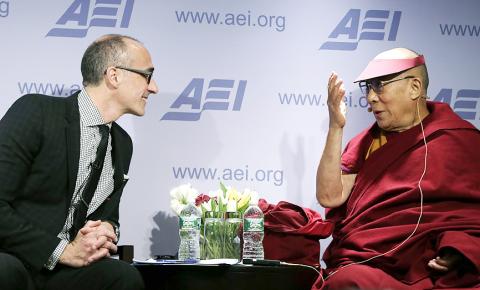US President Barack Obama was to host the Dalai Lama yesterday at the White House over the stern objection of China, which warned the meeting would “inflict grave damages” on the US’ relationship with the Asian powerhouse.
Obama was to greet the Tibetan spiritual leader and fellow Nobel laureate, who is in the US on a speaking tour. The White House did not announce the meeting until late Thursday, prompting a gruff complaint from Beijing in what has become something of a diplomatic ritual whenever Obama meets with the exiled Buddhist monk.
Urging Obama to cancel the meeting, Beijing accused the US president of letting the Dalai Lama use the White House as a podium to promote anti-Chinese activities.

Photo: Reuters
“The US leader’s planned meeting with Dalai is a gross interference in China’s domestic politics,” said Hua Chunying (華春瑩), a spokeswoman for China’s Ministry of Foreign Affairs. “It is a severe violation of the principles of international relations. It will inflict grave damages upon the China-US relationship.”
Beijing routinely protests when world leaders grant an audience to the Dalai Lama, including when Obama met with him in 2010 and again in 2011. Chinese officials denounce the Dalai Lama as a separatist responsible for instigating self-immolations by Tibetans inside China, but he is widely respected around the world for his advocacy of peace and tolerance.
Obama was to host the Dalai Lama in the White House’s Map Room, rather than the Oval Office, where the president traditionally brings a visiting leader for a round of photographs. The private meeting, closed to reporters, suggested an attempt to avoid the appearance of a formal meeting between two heads of state.
The US had no immediate response to the rebuke from China.
However, in announcing the meeting earlier on Thursday, the White House said Obama was meeting with the Dalai Lama in his capacity as a cultural and religious leader.
As if to indicate an overreaction had been expected, officials reiterated that the US recognizes Tibet as part of China and does not support Tibetan independence.
“The United States supports the Dalai Lama’s ‘Middle Way’ approach of neither assimilation nor independence for Tibetans in China,” said Caitlin Hayden, a spokeswoman for the White House’s National Security Council.
She added that presidents of both parties have met with the Dalai Lama for decades.
At the same time, officials said they were concerned about tensions and deteriorating human rights in China’s Tibetan areas, urging Beijing to resume talks with the Dalai Lama or his followers without preconditions.

SECURITY: As China is ‘reshaping’ Hong Kong’s population, Taiwan must raise the eligibility threshold for applications from Hong Kongers, Chiu Chui-cheng said When Hong Kong and Macau citizens apply for residency in Taiwan, it would be under a new category that includes a “national security observation period,” Mainland Affairs Council (MAC) Minister Chiu Chui-cheng (邱垂正) said yesterday. President William Lai (賴清德) on March 13 announced 17 strategies to counter China’s aggression toward Taiwan, including incorporating national security considerations into the review process for residency applications from Hong Kong and Macau citizens. The situation in Hong Kong is constantly changing, Chiu said to media yesterday on the sidelines of the Taipei Technology Run hosted by the Taipei Neihu Technology Park Development Association. With

CARROT AND STICK: While unrelenting in its military threats, China attracted nearly 40,000 Taiwanese to over 400 business events last year Nearly 40,000 Taiwanese last year joined industry events in China, such as conferences and trade fairs, supported by the Chinese government, a study showed yesterday, as Beijing ramps up a charm offensive toward Taipei alongside military pressure. China has long taken a carrot-and-stick approach to Taiwan, threatening it with the prospect of military action while reaching out to those it believes are amenable to Beijing’s point of view. Taiwanese security officials are wary of what they see as Beijing’s influence campaigns to sway public opinion after Taipei and Beijing gradually resumed travel links halted by the COVID-19 pandemic, but the scale of

A US Marine Corps regiment equipped with Naval Strike Missiles (NSM) is set to participate in the upcoming Balikatan 25 exercise in the Luzon Strait, marking the system’s first-ever deployment in the Philippines. US and Philippine officials have separately confirmed that the Navy Marine Expeditionary Ship Interdiction System (NMESIS) — the mobile launch platform for the Naval Strike Missile — would take part in the joint exercise. The missiles are being deployed to “a strategic first island chain chokepoint” in the waters between Taiwan proper and the Philippines, US-based Naval News reported. “The Luzon Strait and Bashi Channel represent a critical access

Pope Francis is be laid to rest on Saturday after lying in state for three days in St Peter’s Basilica, where the faithful are expected to flock to pay their respects to history’s first Latin American pontiff. The cardinals met yesterday in the Vatican’s synod hall to chart the next steps before a conclave begins to choose Francis’ successor, as condolences poured in from around the world. According to current norms, the conclave must begin between May 5 and 10. The cardinals set the funeral for Saturday at 10am in St Peter’s Square, to be celebrated by the dean of the College